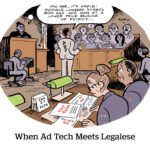The Atlantic used to have dueling video strategies – one aiming to improve direct monetization onsite and the other to extend its reach and audience offsite.
The Atlantic would first monetize video on its flagship site TheAtlantic.com using the Brightcove video player, then push those clips or cuts of them to YouTube.
But because off-platform distribution was secondary, the publisher was missing opportunities to build its audience.
“We were reaching a point where, while our audience was growing on TheAtlantic.com, it wasn’t the kind of audience that was [actively] seeking out our video,” said Kim Lau, The Atlantic’s SVP of digital and business development.
So a couple of months ago, The Atlantic, which was beginning to increase its video production, made a conscious effort to focus on off-platform distribution and monetization on YouTube.
“We started having conversations with YouTube about the opportunity to direct-sell pre-roll into video inventory on our YouTube [channel], which we hadn’t been able to do in the past because we weren’t at the scale where they’d offer it to us,” Lau said.
Going forward, all of The Atlantic’s original video series (it creates about 15–20 original videos per month now and is rolling out new YouTube-specific original series) will be monetized through direct-sold pre-roll on its YouTube channel or through its own site. Lau declined to share the terms of its rev-share with YouTube.
This shift marks a radical change for The Atlantic, which had gotten little monetary return for growing its audience off-platform to date.
“In the past, we were putting one video in multiple places, and you weren’t really able to leverage multiple distribution points together,” Lau said. “Now, once we know a video is doing well on our platform, that will show up in YouTube’s algorithm on its platform.”
If The Atlantic’s on- and off-platform strategies work in tandem, the publisher will better understand how to optimize yield.
Although The Atlantic shares other publishers’ concerns of developing an overreliance on platform-based distribution, the benefits sometimes outweigh the risks.
The publisher will gain opportunities to attract subscribers interested in video content. And longform video, which The Atlantic produces, tends to perform better on YouTube.
“The goal is ultimately to grow streams on our site and beyond and to monetize those at a high rate, so we can continue to fund more investment into video,” Lau said. “In this business, you either have too much inventory you can’t monetize or you don’t have enough and there’s more demand. We’re definitely in the latter bucket.”
And YouTube is also a beneficiary. Although The Atlantic still uses the Brightcove video player, it will increasingly use YouTube’s player on its own site.
Although The Atlantic sees YouTube as its primary video platform, it’s not ignoring Facebook.
“There haven’t really been direct monetization opportunities there, so it hasn’t been as relevant for us,” Lau said. “But we have a huge audience there, and it’s still evolving.”














